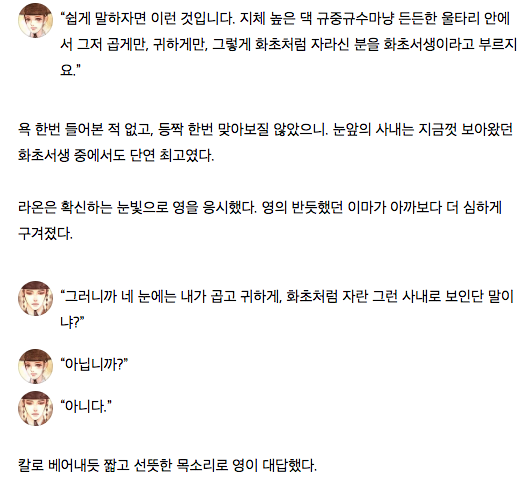In terms of genre, 구르미 그린 달빛 checks all the boxes for me–historical rom-com, crossdressing (guilty pleasure don’t judge), princes who pretend they aren’t princes, and dramatic angst delivered in the most delicious of ways.
Also I mean:

If you’ve watched the first couple episodes, you’ll notice that Sam-nom/Ra-on has an amusing nickname for our prince-in-disguise: 화초서생.
The weird (-ly awesome) part of me that cares more about learning historical vocabulary and antiquated grammar used during the Joseon Dynasty instead of normal 21st century Korean wanted to dissect this word as soon as I heard it.
I’ve seen 화초서생 subbed into English as “silver spoon,” as in one who’s been born with a silver spoon in his mouth. On the other hand, Dramabeans translates the same phrase as “flower scholar,” which if you break down the word, happens to be the most literal translation of the phrase:
- 화초 [花草]: flowering/blooming plant
- 서생 [書生]: a student or scholar of Confucianism (similar to the word 유생, which you might know if you’re a fan of the drama Sungkyunkwan Scandal)
So where does the “silver spoon” translation come from?
In the webnovel, Ra-on explains the nickname to Yeong:

“Put it simply, it’s this. When innocent, well-bred young girls from aristocratic families grow up all delicate and treated preciously, like a blooming flower enclosed within a sturdy fence, we call them flower scholars.”
Out of all the flower scholars Ra-on had met so far in her life, the man in front of her, who had never once heard curse words, who had never once experienced hardship, was decidedly the most extreme of the lot.
Ra-on looked knowingly at Yeong. Yeong’s smooth brow had furrowed deeply as she spoke.
“So, in other words, when you look at me, you think I grew up delicate and precious like a flower?”
“Is that not the case?”
“No,” Yeong answered shortly, his voice sharp and cutting like a knife.
(Oh, Ra-on. Soon you’ll know.)
In the drama, Ra-on uses the analogy of Yeong growing up like a rare flower in a greenhouse, hence 화초서생. From Ra-on’s explanation, the “silver spoon” translation now makes sense; in terms of meaning, that idiomatic expression is the closest English equivalent to 화초서생. Flower Scholar also makes sense based off the more literal translation.
I’m fine with either translation, but find the differences curious. It brings up a question that I’ve thought about unconsciously while doing my own translation work–when does it make sense to be more literal and when do you sacrifice being literal for the sake of style and meaning?
I’ve read a little bit about functional equivalence versus formal equivalence when it comes to translation–for what it’s worth, I’m totally not trained in translation theory or studied it at all; this is just me doing my own research (here’s an interesting paper I found on the topic).
Translation equivalence in general seems to be a hotly debated topic that I don’t have the knowledge to really have an opinion on, however I think I favor my translations sounding as natural as possible in the target language. I take liberties to change sentence structure and add and remove words if I feel that it will convey the sentiment and nuance of the original text better.
But, I don’t like to change up figurative language (metaphors and analogies) too much, unless it really doesn’t make sense in the target language. Figurative language can be so closely connected to the cultural context of the source text that fiddling around too much with it seems harmful. Given that, I personally would translate 화초서생 into English as “flower scholar,” especially since there’s enough context (both in the drama and in the webnovel) to explain to the reader exactly what that means.
Speaking of which, I have started translating bits and pieces of the original 구르미 그린 달빛 webnovel (just for fun and at no regular cadence) to exercise my brain a little more in that direction. It’s pretty fun so far; I forgot how challenging it can be to translate actual prose!
The even better part of all this is that after that terrible experience of taking TOPIK II without studying, this is the first time I feel really motivated to challenge myself in Korean and language in general. And it feels pretty darn good.
2 responses to “화초서생”
Translating 화초서생 “silver spoon” seems like spoiling its metaphorical meaning. I love too much the translation “flowering scholar” ahah Looking for reading your translation of the webnovel (;
LikeLike
*Looking forward to reading* (little mistake ahah)
LikeLike